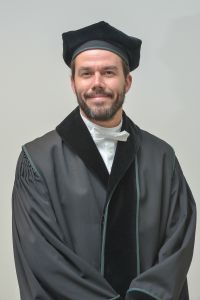Researchers have for many years tried to find answers to the question: what is the root cause of criminal behaviour? In criminology, this question has historically been approached from two different angles: a psychological one and a more sociogenic one. The first focuses on a stable individual dispositions of delinquents, the second on their environment. Prof. Jean-Louis van Gelder, who presented his inaugural lecture recently when he was appointed as Professor of Innovative Methods in Public Safety Research, tries to link these two worlds: with the principle of short-sightedness as a unifying mechanism.
Time Frame Theory

Jean-Louis van Gelder developed a new theoretical model, Time Frame Theory, in which he links the psychological perspective to the sociogenic perspective. The model is based on the idea that criminal behaviour leads to short-term benefits, such as thrills and ‘quick’ money, but that negative consequences, such as sanctions and having a criminal record become evident in the longer term. Those who regularly commit criminal behaviour are therefore actually short-sighted and opt for immediate gratification whilst losing sight of the more long-term consequences of their behaviour.
In the psychological perspective, the importance of a short-term mindset in explaining criminal behaviour has been recognized for a long time, but is considered to be dispositional in nature and to a large extent stable over the course of someone’s life. In doing so, it does not take into account the extent to which short-sightedness may be affected by the environment, such as the neighbourhood in which someone grows up, and by events and experiences such as upbringing, substance use or delinquent friends, suggests Van Gelder.
On the other hand, more sociogenic views have overlooked the possibility that such contextual factors can affect criminality, exactly because they encourage short-term thinking. Van Gelder is of the opinion that to fully understand how the factors that lead to short-sightedness are linked and possibly amplify each other, more research is required. ‘The extent to which this trait is expressed is also strongly determined by one’s environment: the neighbourhood in which someone grows up, their friends and their upbringing are all factors that play a role in this.’
Furthermore, there is no one-sided relationship between short-sightedness and criminal behaviour. Instead it is reciprocal: committing a crime and leading a criminal lifestyle can encourage short-sightedness, sustaining the vicious circle that keeps offenders locked in a life of crime.
Social application
The theoretical model developed by Van Gelder must in the future also be able to contribute to interventions that prevent criminal behaviour. Sound evidence of the causes of and motives behind criminal behaviour is, from a social perspective, very important. Van Gelder: ‘This shows that much criminology research has drifted away slightly too far from reality. There must be better alignment with crime-prevention research and rehabilitation programmes.’
Making better use of unprecedented technology
As a professor of innovative methods in public safety, Van Gelder deploys technology to increase his understanding of criminality. ‘Current research mainly focuses on factors that play a role in how and why someone becomes a criminal,’ he says. ‘However, the way in which a criminal act is carried out is often insufficiently investigated.’
Van Gelder uses Virtual Reality to simulate real-life situations as realistically as possible. He asks incarcerated burglars to burgle in virtual neighbourhoods and break into houses to see how they carry out the burglary; knowledge that is relevant for crime prevention efforts. Van Gelder: ‘Experience has shown that interviews and surveys do not provide all necessary information; an understanding of automatic and unconscious cognitive processes is essential to comprehending human behaviour, but this information is almost impossible to obtain using interviews and surveys. Virtual Reality can bring you much closer to the action.’
If it were up to Van Gelder, this technology would find a place in practice. ‘We are currently preparing a study in which we look at how Virtual Reality can play a role in rehabilitation programmes. If we use a different method to make offenders understand the long-term effects of their actions, we might strike the right chord that could lead to lasting changes to negative behaviour patterns.’





